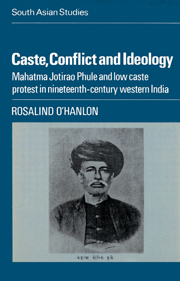 Caste, Conflict and Ideology
Caste, Conflict and Ideology Book contents
- Frontmatter
- Contents
- Acknowledgements
- Notes on translations and area under study, with map
- Part 1 Introduction
- Part 2 Religion and society under early British rule
- Part 3 Jotirao Phule and his circle: the emergence of a distinctive radical voice
- Part 4 The creation of a lower caste identity in history and popular culture, 1869–73
- Part 5 The lower caste community in contemporary society
- Part 6 Ideology and the non-Brahman movement in the 1880s
- 15 Phule's polemic in the 1880s: the ideological construction of rural life and labour
- 16 The non-Brahman movement in the 1880s
- 17 Epilogue: ideology and politics in nineteenth-century western India
- Bibliographic note
- Bibliography
- Glossary
- Index
15 - Phule's polemic in the 1880s: the ideological construction of rural life and labour
from Part 6 - Ideology and the non-Brahman movement in the 1880s
Published online by Cambridge University Press: 14 October 2009
- Frontmatter
- Contents
- Acknowledgements
- Notes on translations and area under study, with map
- Part 1 Introduction
- Part 2 Religion and society under early British rule
- Part 3 Jotirao Phule and his circle: the emergence of a distinctive radical voice
- Part 4 The creation of a lower caste identity in history and popular culture, 1869–73
- Part 5 The lower caste community in contemporary society
- Part 6 Ideology and the non-Brahman movement in the 1880s
- 15 Phule's polemic in the 1880s: the ideological construction of rural life and labour
- 16 The non-Brahman movement in the 1880s
- 17 Epilogue: ideology and politics in nineteenth-century western India
- Bibliographic note
- Bibliography
- Glossary
- Index
Summary
Introduction
The predominantly Mali leadership of the Satyashodhak Samaj employed Phule's polemic in an attempt to capture the mass constituency of Maharashtra's agricultural and labouring castes. The social position of the Mali caste had done much to make this attempt at leadership possible. The Malis were close enough to the larger Maratha-kunbi complex to enable them to make a convincing claim to an identity of social, economic, and cultural interest. Yet the leaders of the caste had sufficient contact with the urban centres to give them access to new ideas of social and religious reform, and were wealthy enough to possess the leisure and resources necessary for radical activity. However, the Mali leadership ran up against two obstacles. The lack of co-operation resulted in internal dissention in the fledgling organisation, and there was resistance to some aspects of Satyashodhak ideology amongst the very Shudra communities whose support they hoped to capture. The first difficulty needed an accumulation of experience. The second was to find a partial resolution, led by Phule, in a new surge of organisational and polemical activity from the early 1880s.
In the period immediately following the leadership problems of 1876–7, Phule turned his energies in a different direction. Between 1876 and 1882 he served on the committee of the Pune Municipality, where members were nominated by the Bombay government. As a Commissioner, he maintained a practical concern with the welfare of the lower castes. He pressed for proper roads to be laid in the old part of Pune city.
- Type
- Chapter
- Information
- Caste, Conflict and IdeologyMahatma Jotirao Phule and Low Caste Protest in Nineteenth-Century Western India, pp. 255 - 273Publisher: Cambridge University PressPrint publication year: 1985
